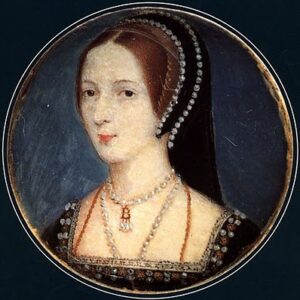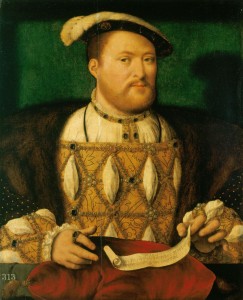 On 2nd October 1528 English reformer and Bible translator William Tyndale published his most influential book, The Obedience of the Christian Man and How Christian Rulers Ought to Govern.
On 2nd October 1528 English reformer and Bible translator William Tyndale published his most influential book, The Obedience of the Christian Man and How Christian Rulers Ought to Govern.
This book features in a story about Anne Boleyn, which is told by both George Wyatt, grandson of Thomas Wyatt the Poet, and the 17th century clergyman and historian John Strype, who used the papers of martyrologist John Foxe. Strype commented that the event of the story “hastened the Overthrow of Abbies, and forwarded those Beginnings of Reformation in Religion, that happened under this King.” Here is Strype’s version of the event:
“Upon the Lady Anne waited a young fair Gentlewoman, named Mrs. Gainsford; and in her Service was also retained Mr. George Zouch, Father to Sir John Zouch. This Gentleman, of a comely sweet Person, a Zouch indeed, was a Suitor in way of Marriage to the said young Lady: And among other Love tricks, once he plucked from her a Book in English called Tyndal’s Obedience, which the Lady Anne had lent her to read. About which Time the Cardinal had given Commandment to the Prelates, and especially to Dr. Sampson, Dean of the King’s Chapel, that they should have a vigilant Eye over all People for such Books, that they came not abroad; that so as much as might be, they might not come to the King’s Reading. But this which he most feared fell out upon this Occasion.
‘For Mr. Zouch ( I use the Words of the MS.) was so ravished with the Spirit of God speaking now as well in the Heart of the Reader, as first it did in the Heart of the Maker of the Book, that he was never well but when he was reading of that Book. Mrs. Gainsford wept because she could not get the Book from her Woer, and he was as ready to weep to deliver it. But see the Providence of God: Mr. Zouch standing in the Chapel before Dr. Sampson., ever reading upon this Book; and the Dean never having his Eye off the Book in the Gentleman’s Hand, called him to him, and then snatched the Book out of his Hand, asked his Name, and whose Man he was. And the Book he delivered to the Cardinal.
 In the mean time, the Lady Anne asketh her Woman for the Book. She on her Knees told all- the Circumstances. The Lady Anne shewed her self not sorry, nor angry with either of the two. But, said she, Well, it shall be the dearest Book that ever the Dean or Cardinal took away. The Noble Woman goes to the King, and upon her Knees she desireth the King’s Help for her Book. Upon the King’s Token the Book was restored. And now bringing the Book to him, she besought his Grace most tenderly to read it. The King did so, and delighted in the Book. For, saith he, This Book is for me and all Kings to read. And in a little Time the King by the Help of this virtuous Lady, by the Means aforesaid, had his Eyes opened to the Truth, to search the Truth, to advance God’s Religion and Glory, to abhor the Pope’s Doctrine, his Lies, his Pomp and Pride, to deliver his Subjects out of the Egyptian Darkness, the Babylonian Bonds, that the Pope had brought him and his Subjects under. And so contemning the Threats of all the World, the Power of Princes, Rebellions of his Subjects at Home, and the raging of so many and mighty Potentates abroad; set forward a Reformation in Religion, beginning with the Triple Crowned Head at first, and so came down to the Members, Bishops, Abbots, Priors, and such like.’
In the mean time, the Lady Anne asketh her Woman for the Book. She on her Knees told all- the Circumstances. The Lady Anne shewed her self not sorry, nor angry with either of the two. But, said she, Well, it shall be the dearest Book that ever the Dean or Cardinal took away. The Noble Woman goes to the King, and upon her Knees she desireth the King’s Help for her Book. Upon the King’s Token the Book was restored. And now bringing the Book to him, she besought his Grace most tenderly to read it. The King did so, and delighted in the Book. For, saith he, This Book is for me and all Kings to read. And in a little Time the King by the Help of this virtuous Lady, by the Means aforesaid, had his Eyes opened to the Truth, to search the Truth, to advance God’s Religion and Glory, to abhor the Pope’s Doctrine, his Lies, his Pomp and Pride, to deliver his Subjects out of the Egyptian Darkness, the Babylonian Bonds, that the Pope had brought him and his Subjects under. And so contemning the Threats of all the World, the Power of Princes, Rebellions of his Subjects at Home, and the raging of so many and mighty Potentates abroad; set forward a Reformation in Religion, beginning with the Triple Crowned Head at first, and so came down to the Members, Bishops, Abbots, Priors, and such like.’
The very having this Book intituled, The Obedience of a Christen Man, was enough to make a Man a Heretick, and reading of it a dangerous Article against any in these Days. But no Wonder the King took a liking to it. For in it there is an Exposition of the XIIIth Chapter to the Romans. Where upon those Words, For be is the Minister of God for thy Wealth, he thus descants, ‘To defend thee from a thousand Inconveniences; from Thieves, Murderers, and them that would defile thy Wife, thy Daughter, and take from thee all that thou hast; yea, Life and all, if thou didst resist, Furthermore, tho’ he be the greatest Tyrant in the World, yet is he unto thee a great Benefit of God, and a Thing wherefore thou oughtest to thank God highly. For it is better to have somewhat, than to be clean stript of all together. It is better to pay the Tenth than to lose all. It is better to suffer one Tyrant, than many. Yea, and it is better to have a Tyrant unto thy King than a Shadow, a passive King; that doth Nought himself but suffer others to do with him what they will, and to lead him whither they list. For a Tyrant tho’ he do no Wrong unto the good, yet he punisheth the evil, and maketh all Men obey: Neither suffereth any Man to rule, but himself only. A King that is soft as Silk, and effeminate, that is to say, turned into the Nature of a Woman, what with his own Lusts, which are as the longing of a Woman with Child, so he cannot resist them; and what with the wily Tyranny of them that ever rule him; shall be much more grievous to the Realm, than a right Tyrant. Read the Chronicles, and thou shalt find it ever so.”
 It’s easy to understand why Henry VIII “delighted in the Book” and declared that “This Book is for me and all Kings to read.” It is his reading of this book that is credited with him making the decision to break with Rome because it made him realise that kings were accountable only to God, and not to the Pope.
It’s easy to understand why Henry VIII “delighted in the Book” and declared that “This Book is for me and all Kings to read.” It is his reading of this book that is credited with him making the decision to break with Rome because it made him realise that kings were accountable only to God, and not to the Pope.
You can read William Tyndale’s The Obedience of a Christian Man online at http://www.godrules.net/. There is much more to it than the idea that rulers are only accountable to God.
William Tyndale was also known for his English translation of the New Testament, the first to be printed in English. You can see photos of a 1526 copy of it on the British Library website at https://www.bl.uk/collection-items/william-tyndales-new-testament. You can read Tyndale’s New Testament online at http://www.biblestudytools.com/tyn/.
Also on this day in history…
- 1452 – Richard III, the last Plantagenet king, was born at Fotheringhay Castle, Northamptonshire. Click here to read more.
- 1501 – Catherine of Aragon arrived in England, landing at Plymouth in Devon. She had come to England to marry Prince Arthur, the heir to the throne of England.
- 1514 – Mary Tudor, sister of Henry VIII, set off from Dover to sail to France to marry King Louis XII.
- 1536 – Start of the Lincolnshire Rising, the beginning of the Pilgrimage of Grace. It was sparked off by a sermon at evensong on the 1st October at St James’s Church, Louth, and by a visitation from a registrar on 2nd October. Click here to read more.
Notes and Sources
- Strype, John (1721) Ecclesiastical memorials : relating chiefly to religion and the reformation of it, and the emergencies of the Church of England, under King Henry VIII, King Edward VI and Queen Mary the First in Three Volumes with a large appendix to each volume, containing original papers, records, &c., Volume I, p. 112-113. Read online at http://archive.org/stream/ecclesiastical01stry#page/n141/mode/2up.